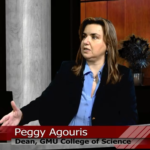GMU College of Science with Dean Peggy Agouris
(May 22, 2019) Catherine Read sits down with Peggy Agouris, Dean of the George Mason University College of Science at the time of this interview. [Effective July 1, 2019, Peggy Agouris became Provost of the College of William & Mary.] They discuss the history of the college and how that history has positioned the college to be on the cutting edge of its specialities.
The GMU College of Science was founded in 2006, after breaking off from the College of Arts and Sciences, and merging with the School of Computational Data Science. It now serves as one of the largest research colleges in the state, with approximately 4,000 students with declared majors in the school. The College of Science also serves to support students from other disciplines, as science intersects with many of the majors from the University’s varied offerings.
George Mason University started as a branch campus of the University of Virginia in 1947, and broke off to become its own entity in 1972. Being a brand new state university, the college needed to differentiate itself in order to attract students. Early on, it adopted innovative curriculum based on what companies were looking for. This led the university to be in on the ground floor of the data science industry.
As information technology programs took off across the nation and employers were looking for graduates who were trained in the field, George Mason was well poised to capitalize on this growth. The school formed partnerships with big players in the technology industry, and students were gaining access to hands on experiences in the field.
This hands-on, innovative approach to education led to George Mason offering the very first PhD program in computational sciences. As the industry forged ahead, the school understood the intersection of data science with other related fields, and decided to bring all of the science programs under one roof.
One of the unique features of the College of Sciences is the Data Lab, which is used by industries for research purposes. Students work on projects for local businesses, and also provide outreach to the local K-12 population, to show applications of data science. Giving students access to hands-on learning through real-life examples is an important aspect of the Data Lab. Additionally, Agouris notes that it is important to inspire younger students to understand how data science has an impact on their world.
In the second segment of the show, she talks about the importance for students to develop a variety of competencies and skill sets. The applications of data science and technology fields are ever changing, so it is important to cultivate the skills that will take students the furthest they can go. She speaks about how it is important for students to acquire good communication, presentation and writing skills, in addition to the scientific training, as employers want to hire well-rounded individuals.

Finally, Agouris is excited about new and emerging fields that are being born each year. The Urban Science Initiative is a new program of study that has students evaluate the impact of environmental factors and variables on the human population. For example, students would study the affects of having a large business such as Amazon move into a neighborhood to understand the impacts that this change has on residents. The impacts that are discovered can then be useful in helping to shape policy in order to minimize harmful outcomes.